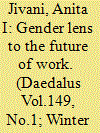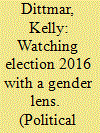|
|
|
Sort Order |
|
|
|
Items / Page
|
|
|
|
|
|
|
| Srl | Item |
| 1 |
ID:
163870


|
|
|
| 2 |
ID:
171115


|
|
|
|
|
| Summary/Abstract |
Acquiring new skills will be foundational to surviving in and leading in the workplace of the future. Organizations must make concerted efforts in upskilling women to maintain high levels of productivity and growth. This acquisition of new skills will help women make the transition into new jobs that will be necessary due to automation and today's workplace realities. Without it, the workplace could become even more unbalanced than it is today. Further, today's gaps need to be filled in a holistic manner to ensure that not only are tomorrow's technologies created by a diverse group of people, but also that they are implemented in a human-centered manner that aligns with the original intention. The private sector has a vital role to play in preparing the workforce that it will need and should prototype holistic solutions to help respond to this critical need.
|
|
|
|
|
|
|
|
|
|
|
|
|
|
|
|
| 3 |
ID:
088712


|
|
|
|
|
| Publication |
2009.
|
| Summary/Abstract |
With the hypothesis in mind that discrimination against women increases the likelihood that a state will experience internal conflict, this article contends that considering gender is a key part of an effective peacebuilding process. Evidence gathered by studying peacebuilding from a feminist perspective, such as in Rwanda and C te d'Ivoire, can be used to reconceptualize the peace agenda in more inclusive and responsible ways. Following from this, the article argues that a culturally contextual gender analysis is a key tool, both for feminist theory of peacebuilding and the practice of implementing a gender perspective, in all peace work. Using the tools of African feminisms to study African conflicts, this contribution warns against "adding women" without recognizing their agency, emphasizes the need for an organized women's movement, and suggests directions for the implementation of international laws concerning women's empowerment at the local level. The article concludes by suggesting that implementation of these ideas in practice is dependent on the way in which African feminists employ mainstreaming, inclusionary, and transformational strategies within a culturally sensitive context of indigenous peacebuilding processes.
|
|
|
|
|
|
|
|
|
|
|
|
|
|
|
|
| 4 |
ID:
149352


|
|
|
|
|
| Summary/Abstract |
The presence of women candidates in both major parties’ presidential primaries, including a likely woman Democratic nominee, has increased the attention paid to gender dynamics in the 2016 US presidential election. However, the presumption that previous presidential elections—without female prominent contenders—were gender neutral is false: gender dynamics have been at play in all US presidential elections to date. The nation’s top executive office is arguably the most masculine in American politics. Duerst-Lahti (1997) describes the presidency as a gendered space in which masculine norms and images are reified as the ideal, adding, “the masculinist assumption-made-normal is strong and is made even stronger when it goes unnoticed for its gendered aspects” (22). Presidents and presidential contenders, whether male or female, are expected to meet the masculine expectations of the office through words and actions, and those around them—family, spouses, and advisors—often play a role in shaping the degree to which they are successful. In navigating American politics, candidates also face gendered treatment by opponents, voters, and media, reminding us that presidential politics is far from gender neutral. These gender dynamics have been detailed by scholars, particularly in analyses of the presidential candidacies of women (Beail and Longworth 2013; Carlin and Winfrey 2009; Carroll and Dittmar 2009; Dittmar and Carroll 2013; Duerst-Lahti 2013; Falk 2010; Han and Heldman 2007; Heldman, Carroll, and Olson 2005; Lawrence and Rose 2009; McClain, Carter, and Brady 2005). However, the depth and nuance in scholarly analyses are rarely evident in popular dialogue about the ways in which gender shapes presidential elections.
|
|
|
|
|
|
|
|
|
|
|
|
|
|
|
|
|
|
|
|
|